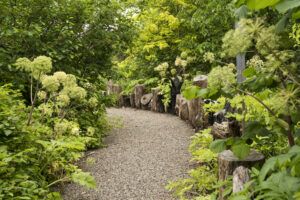
Permaculture careers, an achievable dream or fantasy?
By Daniel Fuller
Permaculture is a garden philosophy that works with nature, rather than against it. It is an attractive field for many horticulturists, but there aren’t many jobs available. How can you prepare so that your resume stands out when you find that one-in-a-million permaculture job?
Most permaculture roles are complex, so you will need to show that you have diverse experience on your resume.,
While a general horticulture qualification goes a long way, it does not hurt to get a specific permaculture qualification. There are accredited courses ranging from Cert II right up to the Diploma level that you can study through TAFE. However, many ‘permaculturists’ opt for the unaccredited, but internationally relevant, Permaculture Design Certificate (PDC) which may be available at your local permaculture gardens or community centre.
Volunteering is one way to get your foot in the door if you already know a farm you want to work for. Not many people are willing to work for free but if you are passionate about permaculture, you may as well give it a go. You stand to gain real-world experience that will stand out on your resume, so what have you got to lose?
Some paid roles that you may aim for include consultancy, farm management, garden design, landscape construction, as well as media and education roles.
The best way to guarantee a career in permaculture is to create your own job. If you have access to land, you can create a farm or garden, or alternatively you can offer your consulting, design or construction services to homeowners.
Produce isn’t always the main income source of an enterprise. Often, the farm is a way to gain attention for another product or service. Some farms host workshops, others upload content to YouTube to earn advertising and sponsorship income. “Obtain a yield”, as the adage goes.
Yarra Valley Estate is a wedding and corporate events venue with an acre of edible forest that is designed, built and maintained on permaculture principles. They use most of what they grow in the kitchen, though they preserve a lot and visitors can taste and buy plants when they visit.
They don’t see the edible forest as a major income source. One of the owners, Louise Ward started the garden as a project of passion and officially opened it to the world in 2018. It’s a source of joy to her, the two horticulturists that work there and the guests that visit or stay. It’s also a great way to get people telling their friends about the business and to get free media attention, which brings new clients into their sales funnel.
Jamie Sweetman is the head gardener in the edible forest and I interviewed her about the work she does every day, and how she landed what she described as a “unicorn” dream job. It turns out, there really are no shortcuts when it comes to permaculture. After working for over a decade in nurseries, parks and gardens, as well as having a Diploma of Horticulture and a Bachelor of Landscape Design under her belt, she then added a PDC to her repertoire because she knew the sort of job she wanted to get.
So, it wasn’t luck when she stumbled upon her dream job advertised at Yarra Valley Estate’s edible forest. A lot of people that applied for that job, and Jamie got the position because she’d done the hard yards and her resume stood out.
Her advice to anybody wanting to get a job like hers is to not give up and to keep working towards your goal. Permaculture is becoming more mainstream, but it is unlikely you are going to land your dream job straight away.
All you can do is make yourself as employable as possible and have fun while you are doing it. Find a job that will upskill you, such as teaching you how to install and repair irrigation systems.
If you really want to be taken seriously, find a local place where you can gain your PDC, or study permaculture at TAFE to add to any other trade qualifications you may already have.
It is also advisable to add a job alert to Seek or HortPeople.com so that any time a permaculture job is posted, you are alerted.
Daniel Fuller
M: 042 6169 708
E: hello@plantsgrowhere.com
